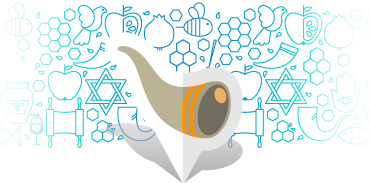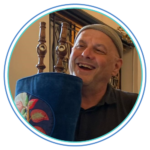
What are we that You take notice of us? (Psalm 8: 4)
Rabbi Dr René Pfertzel | Kingston Liberal Synagogue, UK
Chair of the EUPJ Rabbinic Assembly
What is it about the High Holy Days that makes this stretch of the Jewish year a moment for which we are all waiting with a mixture of trepidation and anxiety? After all, the Jewish calendar is replete with festivals, celebrations, remembrances, and occasions to eat. Why is this time so special?
If Pesach is all about reflecting on our destiny as a community, Rosh Hashanah and Yom Kippur, which occur six months later, focus on each of us as individuals. In other words, it is a 10-day long – some say 40 days – reflection and meditation on what it means to be human.
“What are we that You take notice of us?” asks the psalmist. What are we indeed? How do we conduct our lives? How do we use that God-given freedom of choice? How do we engage with other human beings? With respect or with disregard? It is often said that Judaism focuses on the here and now, and that our conduct is measured by the criteria of robust and positive ethics. But what does it say about human nature?
Humanity is diverse, ever-evolving, and it cannot be contained in one single definition. Our tradition has many rules and regulations, as if to say, “Don’t overthink who you are.” Your actions define your nature more than words may do. In a way, Judaism embraces the ambiguity and complexity of human nature and acknowledges that it changes over time – even in one’s lifetime.
We fail, more often than not, to reach our target – cheyt in Hebrew, often translated as “sin”. But this is alright too. Perfection is not from this world, and part of being human is to fail – provided we learn from our mistakes! The drama that is being played out on the day of Yom Kippur always ends the same way: God’s forgiveness is granted because what is the alternative? Oblivion? Life must go on for human beings to experiment the challenges and the learning.
The multiplicity of mitzvot comes with choice. Some would naughtily claim that if God has given so many commandments, it is maybe because one needs to circumvent them to grow. Judaism is about radical freedom, as brilliantly said in the Book of Deuteronomy: “See, I have placed before you life and good, death and evil.” (Chap. 31 verse 15) It is fair to say that Torah does not give much leeway: Choose life, says the Eternal, but the choice is nonetheless there.
Torah gives us choice to determine our life and values. Life is complicated and, even with ethical guidelines, it is not always easy to make the proper decision. Rather than try to deny the complexity of situations we may find ourselves in, Torah asks us to face it head-on. Eventually, we are responsible for our own actions, so it is better to weigh our options before acting.
It is not possible to take a completely disinterested position. The message of our prophets, the many laws that try to establish a fair and just society, and also our experience as a people over the centuries, compel us to take a clear stance on moral issues with which our world is struggling. We cannot remain silent when others suffer. We have the responsibility to resist all forms of oppression wherever it emerges. The world is largely the result of our actions – or our inaction.
On Rosh Hashanah and Yom Kippur, we examine our deeds on a very personal and intimate level, and this cheshbon ha-nefesh, accounting of the soul, needs to be translated in our actions in the world.
What are we that You take notice of us? We are all unique, a universe in its own right, and we walk along our paths in this world, trying to make sense of it and to understand where we stand. We often stumble, err, make mistakes, and sometimes, we need to take stock of the situation.
How precious then is this period of the High Holy Days? It teaches us what our humanity is and what life is. The whole purpose of life is to learn and to grow. For those who believe that death is not the end, it is the assurance of a long process of discovery and learning beyond today. For those who don’t, the assurance of a full-fledged and satisfactory life.
May you be inscribed in the Book of Life, a book that records your achievements, your successes, but also your failures. A book that celebrates your journey as a human being.
❚ Back to Previous Page ❚


